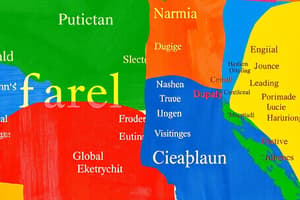Podcast
Questions and Answers
Which language family does English belong to?
Which language family does English belong to?
- West Germanic (correct)
- Romance
- Turkic
- Slavic
English grammar has a complex system of verb conjugations similar to Latin.
English grammar has a complex system of verb conjugations similar to Latin.
False (B)
Name one significant event that influenced the vocabulary of the English language.
Name one significant event that influenced the vocabulary of the English language.
The Norman Conquest
English language is largely structured in _____ order.
English language is largely structured in _____ order.
Match the following English variations with their characteristics:
Match the following English variations with their characteristics:
Flashcards
English's origin
English's origin
English developed from Old English, influenced by other languages, and has evolved over time.
English variations
English variations
Regional differences in pronunciation, vocabulary, and grammar exist between English dialects like American and British English, and Australian English.
English structure
English structure
English sentences typically follow a Subject-Verb-Object order.
English vocabulary
English vocabulary
Signup and view all the flashcards
English as global language
English as global language
Signup and view all the flashcards
Study Notes
Introduction to English Language
- English is a West Germanic language that originated in England.
- It has evolved over centuries through influences from various languages.
- English is now a global language, spoken by a large number of people as a first or second language.
- It serves as a primary language in international communication, a significant factor in business, science, and diplomacy.
Key Features of English
- English evolved from Old English, which in turn derived from various Germanic dialects.
- The Norman Conquest significantly impacted English vocabulary with the introduction of French words.
- The standardization of English occurred gradually, with influences from various dialects and evolving language norms.
- English possesses a large vocabulary, derived from various sources and influenced by diverse cultural interactions.
- The structure of English sentences is largely SVO (Subject-Verb-Object).
Variations of English
- Different regional varieties exist, each with its own distinct pronunciation, vocabulary, and grammar.
- American English and British English are prominent variations with differences in spelling, pronunciation, and vocabulary usage.
- Other regional variations (e.g., Australian English, Canadian English) also exist.
Grammatical Structure
- English employs a relatively simple subject-verb-object sentence structure.
- A complex system of tenses is used to indicate the time of an action.
- Verb conjugations are not as complex as in some other languages, emphasizing different sentence structures to express nuances.
- Extensive use of prepositions is a distinguishing feature of English grammar.
Vocabulary and Spelling
- English boasts an immensely large vocabulary derived from multiple sources encompassing Germanic, Romance (Latin-derived), and other influences.
- Spelling and pronunciation often do not have a one-to-one correspondence, which is a known characteristic of the language.
- English spelling has evolved considerably over time, differing from its etymological origins.
English as a Global Language
- The widespread use of English stems from its historical and cultural influence, its use in international communication, and its adoption as a language of commerce and education.
- English acts as a common platform for cross-cultural interaction, enabling communication across geographic and linguistic boundaries.
- English's global presence fosters cultural exchange, knowledge dissemination, and economic collaboration.
Modern English Use Cases
- English is extensively used in international business, diplomacy, and commerce as a common communication language.
- It plays a critical role in global scientific publications, enabling researchers and academics from diverse backgrounds to collaborate.
- English is prevalent in the media, literature, and entertainment industries, influencing global trends and cultural exchange.
Studying That Suits You
Use AI to generate personalized quizzes and flashcards to suit your learning preferences.




